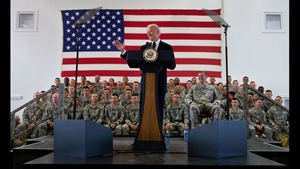With Russia's official annexation of the strategically significant Crimea region of Ukraine, Western powers led by the U.S. are now turning their military attention toward combating what they see as illegal incursions into the sovereign territory of Eastern European nations.
The most vocal instance of that attention came from Vice President Joe Biden during a Mar. 18 meeting with Poland's President Bronislaw Komorowski, according to The Washington Post. Despite Russia's military might and unofficial occupation of the seaside region of Ukraine, Biden said that all North Atlantic Treaty Organization nations have nothing to fear with the U.S. military at their backs.
Carrying a big stick
"You have an ally whose [defense] budget is larger than the next 10 nations in the world combined, so don't worry about where we are," Biden told Bronislaw at a meeting on Tuesday, as quoted by The Washington Post. The Polish president had raised concerns that all of Europe seemed to be slashing military funding, while Russia had been operating under an opposite strategy.
Crimea's recent vote to join the Russian Federation raised fears among former Eastern bloc nations that Moscow was not necessarily finished with incursions into other territories. Crimea marks the second sovereign nation with which Russia has engaged in hostilities. In 2008, Russia and Georgia fought a shortened several-day war over contended territories in the South Ossetia region.
The NATO agreement states that any member nation that comes under attack from a non-NATO party is due the protection of all other member states. While closely allied with many NATO countries, Ukraine is not part of the agreement.
Analyzing European defense
According to Reuters, Russia's actions may be prompting some U.S. military policy officials to rethink their overall strategy on the European stage.
The general trend in recent years has been to reposition troop strength and equipment capabilities to the Pacific region in response to a more militarily and politically potent China, but President Vladimir Putin's actions may necessitate a new strategy.
"This requires a complete reappraisal of how we approach Russia," Fiona Hill, U.S. national intelligence officer for Russia from 2006 to 2009 and current head of the Europe program at the Brookings Institution in Washington, told Reuters. "Putin has made it very clear he intends to reassert Russia's sphere of influence … We don't have a strategy to deal with that."

